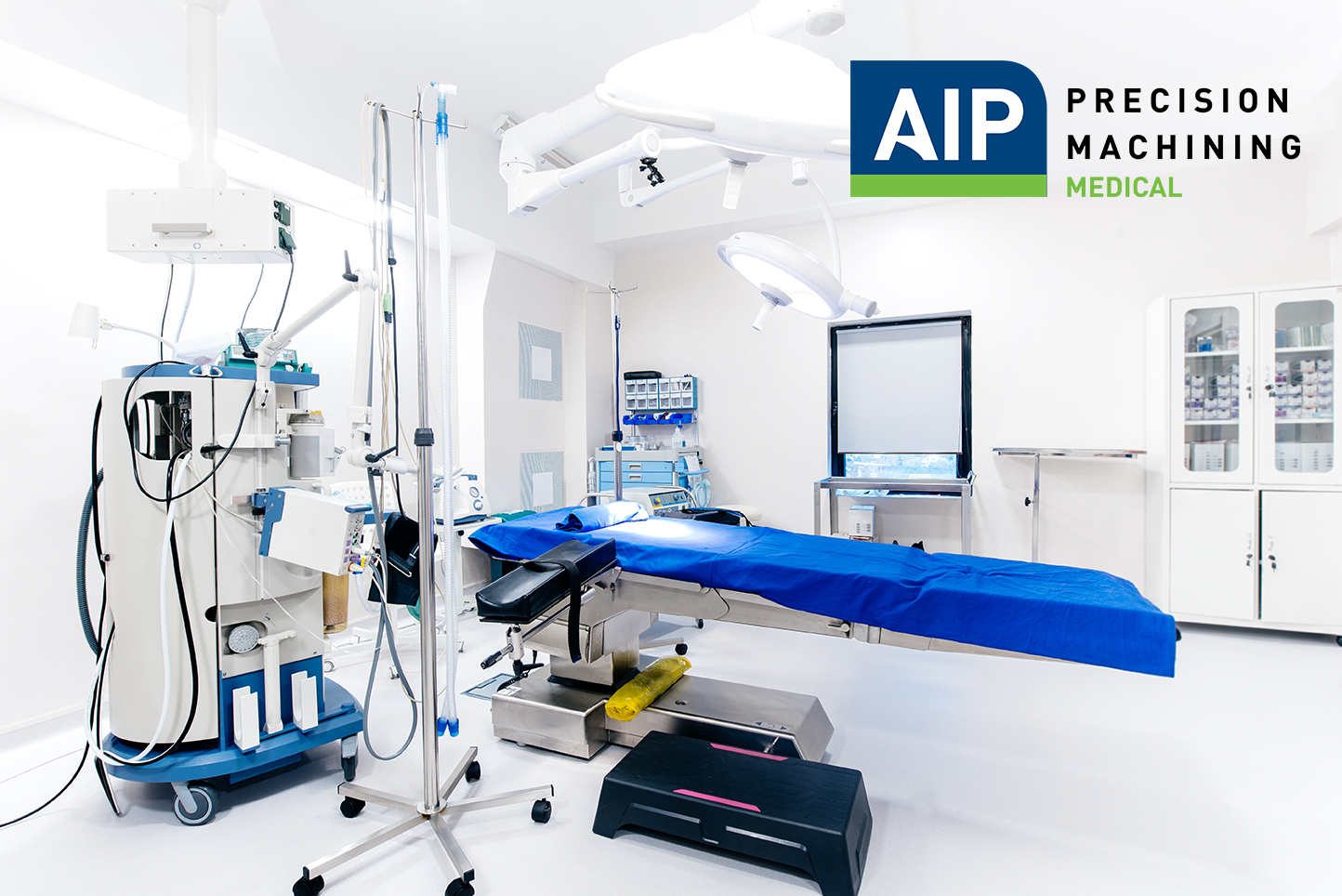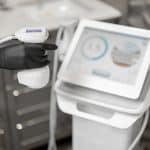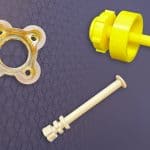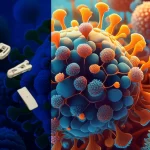
Material selection plays a crucial role in medical device manufacturing, where patient safety and device performance cannot be compromised. Polyacetal Delrin® stands out as a preferred engineering plastic for medical applications, offering exceptional mechanical properties and reliability.
The combination of dimensional stability, chemical resistance, and biocompatibility makes Delrin® an ideal choice for various medical applications.
This FDA-approved material excels in the production of surgical instruments, drug delivery devices, and prosthetic components. Medical device manufacturers benefit from Delrin®’s excellent machining characteristics, sterilization compatibility, and consistent performance across different manufacturing processes, from injection molding to CNC machining.
Properties of Polyacetal Delrin® for Medical Devices
Polyacetal Delrin® exhibits a comprehensive set of properties that make it exceptionally suitable for medical device applications. These characteristics ensure reliable performance across various medical implementations while maintaining strict safety standards.
Chemical resistance and biocompatibility
Delrin® demonstrates excellent resistance to organic solvents and neutral chemicals, particularly at temperatures below 70°C. The material maintains strong chemical stability against alcohols, aldehydes, esters, and hydrocarbons while resisting discoloration. For medical applications, specific grades like Delrin®® SC comply with USP Class VI and ISO 109993 standards, though biocompatibility studies indicate limited direct bone contact applications.
Mechanical strength and dimensional stability
The material’s mechanical properties make it ideal for precision medical components:
| Property | Value/Characteristic |
| Tensile Strength | 10,000 psi at room temperature |
| Flexural Modulus | 410,000 psi stiff |
| Elongation | 10-40% at break |
| Temperature Range | Effective to -40°C |
Delrin® maintains exceptional dimensional stability with tight tolerances of +/-0.005, crucial for medical device precision. Its low moisture absorption makes it particularly suitable for humid environments without compromising structural integrity.
Low friction and wear resistance
The material’s tribological properties are particularly valuable in medical applications:
- Coefficient of friction against steel: 1-0.3
- Consistent performance under varying thermal conditions and loads
- Superior resistance to both adhesive and abrasive wear
- Excellent fatigue resistance under cyclic stress of 5,000 psi
These properties make Delrin® especially effective in applications requiring smooth actuation and repeated movement, such as surgical instruments and drug delivery devices. The material’s inherent lubricity eliminates the need for external lubricants, maintaining cleanliness in medical environments.
Manufacturing Techniques for Delrin® Medical Components
Manufacturing Delrin® medical components requires precise control over fabrication processes to ensure optimal performance and reliability. Two primary manufacturing methods dominate the medical device industry: injection molding and CNC machining.
Injection molding process
Injection molding represents the preferred method for high-volume production of Delrin® medical components. The process enables the creation of complex geometric shapes while maintaining tight tolerances. Modern injection molding systems utilize hot-tip runners and controlled cavity pressures to achieve optimal results. Key processing parameters include:
| Parameter | Recommended Range |
| Melt Temperature | 215°C ± 5°C |
| Nozzle Temperature | 190°C |
| Packing Time | Based on wall thickness |
| Gate Design | Minimum 50% of wall thickness |
CNC machining of Delrin® parts
CNC machining offers exceptional precision for medical-grade Delrin® components, achieving tolerances up to ±0.001 inches. The material’s high machinability factor (0.7 compared to steel) enables efficient processing with standard equipment. Sharp cutting tools with high clearance angles produce the best results, while air-based cooling systems help maintain dimensional stability during machining.
Design considerations for Delrin® components
Successful manufacturing of medical devices requires careful attention to design elements that optimize both production efficiency and component performance:
- Maintain uniform wall thickness
- Wall Thickness and Structural Elements
- Include appropriate filets and ribs
- Design proper gate locations
- Avoid sharp internal corners (minimum 1mm radius)
Temperature management plays a crucial role in both manufacturing processes. Parts should be ejected hot during injection molding and allowed to cool naturally to prevent warping. For CNC machining, maintaining temperatures below 121°C ensures optimal material properties and prevents degradation during processing.
The manufacturing process selection depends on factors including production volume, component complexity, and required tolerances. While injection molding suits high-volume production of complex parts, CNC machining excels in producing precise, custom components for specialized medical applications.
Applications of Delrin® in Medical Devices
The versatility of polyacetal Delrin® has established it as a cornerstone material in modern medical device manufacturing. Its exceptional properties make it particularly valuable across various medical applications, from precision instruments to life-changing prosthetics.
Drug delivery systems
Delrin®’s dimensional stability and wear resistance make it ideal for drug delivery devices. The material excels in insulin delivery pens, where precise dosing mechanisms rely on its superior mechanical properties. Modern inhalers utilize Delrin® components for dose-counting mechanisms, leveraging its low friction properties for smooth actuation. Patch pumps and auto-injector devices benefit from Delrin®’s ability to maintain tight tolerances and resist deformation over multiple use cycles.
Surgical instruments and equipment
Medical professionals rely on Delrin®-based surgical instruments for their durability and precision. The material’s properties are particularly valuable in:
| Application | Key Benefit |
| Tubing Clamps | High fatigue resistance |
| Diagnostic Equipment | Chemical resistance |
| Valve Components | Low moisture absorption |
| Medical Pumps | Dimensional stability |
Prosthetics and orthopedic devices
Delrin® has revolutionized prosthetic development, particularly in joint applications. The LIMBS Knee system demonstrates Delrin®’s capabilities in prosthetic applications, utilizing its high stiffness and wear resistance over millions of flexing cycles. Clinical studies have shown remarkable success in hip prostheses, where Delrin® components exhibit:
- Ten times higher creep resistance compared to ultra-high molecular weight polyethylene
- Exceptional hardness for resisting abrasive action
- Minimal wear on articulating components
- Benign tissue response similar to polyethylene implants
The material’s performance in orthopedic applications is particularly noteworthy, with over 7,000 successful surgical procedures documented using Delrin®-based prostheses. Its combination of strength, durability, and biocompatibility continues to drive innovation in medical device design, enabling more compact and efficient solutions for patient care.
Regulatory Compliance and Quality Control
Ensuring compliance with regulatory standards is paramount in medical device manufacturing using polyacetal Delrin®. Manufacturers must navigate complex requirements while maintaining stringent quality control measures throughout the production process.
FDA regulations for Delrin® medical devices
The Food and Drug Administration (FDA) maintains strict oversight of medical-grade Delrin® components through a comprehensive review process. Manufacturers must demonstrate compliance with FDA-recognized voluntary consensus standards, particularly ASTM F1855-00, which specifically addresses polyoxymethylene for medical applications.
The regulatory framework requires:
- Premarket submission validation
- Conformity to internationally recognized standards
- Documentation of material composition and processing methods
- Verification of biocompatibility for specific applications
Sterilization methods for Delrin® components
Medical device manufacturers can employ various sterilization techniques for Delrin® components, each with specific parameters and considerations:
| Sterilization Method | Temperature | Duration | Maximum Cycles |
| Steam Autoclave | 134°C | 10 minutes | 800 cycles |
| Ethylene Oxide | 55°C | 45-80 minutes | Unlimited |
| Gamma Radiation | Ambient | Process-specific | Limited |
| Plasma (H₂O₂) | 45°C | 45-80 minutes | 1,000+ cycles |
Quality assurance protocols in manufacturing
Quality control measures for medical-grade Delrin® components incorporate ISO13485 certification requirements and comprehensive testing protocols.
Manufacturing facilities must maintain:
- Process Validation
- Initial inspection of molded parts
- Dimensional accuracy within 0.001″ tolerance
- Material property verification
- Surface finish evaluation
- Documentation Requirements
- Complete Design for Manufacturability (DFM) records
- Material certification documentation
- Sterilization validation reports
- Batch testing results
Manufacturers must perform regular quality audits and maintain detailed records of all testing procedures. The emphasis on precision and quality control ensures that final products meet or exceed the required specifications for medical applications while maintaining compliance with regulatory standards.
Conclusion
Polyacetal Delrin® stands as a cornerstone material in medical device manufacturing through its exceptional combination of mechanical strength, chemical resistance, and dimensional stability. Medical manufacturers benefit from its versatile processing options, whether through precision CNC machining or high-volume injection molding, while maintaining strict tolerances and consistent performance. These capabilities, paired with excellent wear resistance and biocompatibility, make Delrin® an optimal choice for demanding medical applications ranging from surgical instruments to advanced drug delivery systems.
Medical device manufacturers must navigate complex regulatory requirements while maintaining the highest quality standards for Delrin® components.
Strict adherence to FDA regulations, proper sterilization protocols, and comprehensive quality control measures ensure reliable performance and patient safety across all applications. The continued advancement of medical device technology, supported by Delrin®’s proven track record, promises enhanced patient care through reliable, precise, and safe medical components.
Achieve Precision and Biocompatibility with Delrin® Machining by AIP – our ISO 13485-certified facilities ensure top-quality Delrin® components for medical devices, and we invite you to request a quote today to get started on your project.
FAQs
- Is Delrin® utilized in the production of medical devices?
Yes, Delrin® is extensively used in medical applications due to its excellent properties such as high-performance impact toughness, chemical resistance, low wear and friction, spring recovery, and creep resistance. - What are some common uses of Delrin® material?
Delrin® is highly valued in various industrial and mechanical applications due to its robust properties. It is particularly suited for components that are exposed to moist or wet environments, such as pump and valve components. Other frequent applications include gears, bearings, bushings, rollers, fittings, and electrical insulator parts. - How are plastics applied in medical devices and equipment?
Plastics are widely used in the medical field, particularly for items like intravenous blood bags and containers for medical waste. They are chosen for their safety and effectiveness in storing fluids.






